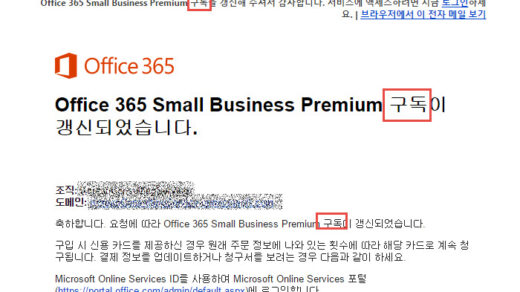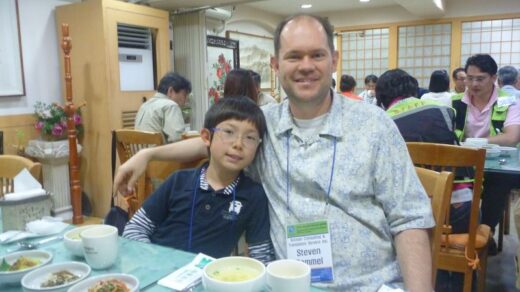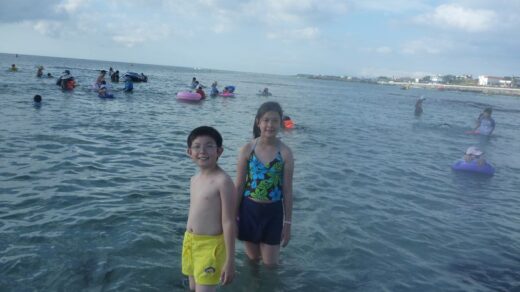I met Professor Hosaka Yuji at the inaugural meeting of the World FTA Forum, which is the association run by Chairman Chang-Woo Lee, my former boss from LG International Corp. At that meeting, we became associates by virtue of our joint membership on the World FTA Forum operating committee. (Professor Hosaka and Chairman Lee are 4th and 5th from left, respectively, in the photo below.)
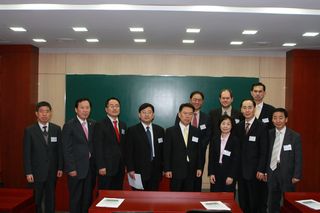 Professor Hosaka is originally from Japan and currently teaches Japanese studies at Sejong University [EXPIRED LINK REMOVED: https://www.sejong.ac.kr/eng/index] in Seoul. But what’s extra remarkable about him is that he is a naturalized Korean citizen!
Professor Hosaka is originally from Japan and currently teaches Japanese studies at Sejong University [EXPIRED LINK REMOVED: https://www.sejong.ac.kr/eng/index] in Seoul. But what’s extra remarkable about him is that he is a naturalized Korean citizen!
His decision to change nationalities came about as he studied the history of Dokdo (called “Takeshima” in Japanese), which are a couple islands in the East Sea (sometimes called the “Sea of Japan”) and which are the subject of a long dispute between Korea and Japan. (A few Koreans are even taking this dispute to the billboards [EXPIRED LINK REMOVED:
https://www.rjkoehler.com/2010/01/30/dokdo-billboard-near-los-angeles/] and newspapers of the US.)
Both countries claim ownership, but Korea has managed to occupy the islands militarily and in the course of his studies on the subject, Professor Hosaka came to accept the Korean position. He is now Director of the Dokdo Research Institute and a leading Korean advocate for Korean sovereignty of the islands.
Last Thursday’s edition of the Jungang Ilbo published an article by Professor Hosaka regarding his meeting with Prime Minister Hatoyama in 2006 [EXPIRED LINK REMOVED: https://article.joins.com/article/article.asp?total_id=4111142]. It is a remarkable recount of the events and I have included the Korean article and its English translation below.
—–
내가 만난 하토야마 총리
My Meeting with Prime Minister Hatoyama
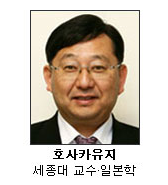 나는 2006년 5월에 지인의 소개로 방한 중이던 하토야마 유키오 일본 민주당 간사장(당시)을 만났다. 독도에 대한 한국 측 논리를 일본어로 설명해 줄 사람을 찾았기 때문이다.
나는 2006년 5월에 지인의 소개로 방한 중이던 하토야마 유키오 일본 민주당 간사장(당시)을 만났다. 독도에 대한 한국 측 논리를 일본어로 설명해 줄 사람을 찾았기 때문이다.
An acquaintance arranged for me to meet Yukio Hatoyoma when he visited Korea in May 2006. At the time, he was General Secretary of the Democratic Party of Japan and was looking for someone to explain to him in Japanese the logic of Korea’s point of view regarding Dokdo.
당시의 민주당은 2005년 9월의 중의원 선거 참패로 국회의원 수가 격감한 상황이었다. 그러나 나는 일본 제1야당에도 한국 측 독도 인식을 전달하는 것이 큰 의미가 있다고 생각하고 요청에 응했다.
Having been crushed in the House of Representatives elections of September 2005, the Democratic Party of Japan had seen their numbers in the Diet fall sharply. But I agreed to the request because I saw it as a meaningful opportunity to share the perspective of Korea regarding Dokdo with the leading Japanese opposition party.
서울의 어느 호텔 음식점에서 만난 하토야마 간사장은 언론 매체를 통해서 본 것보다 훨씬 예리한 인상을 주는 인물이었다. 민주당 국회의원 2명과 비서실장, 그리고 나의 지인이 동석했다. 시간은 당초 30분을 예정했으나 그들은 내 설명을 1시간 반 정도 들었다. 그래도 시간이 충분치는 못했다. 그런데 내 설명을 듣고 나서 하토야마 간사장은 독도가 조선 땅임을 인정한 1877년의 ‘태정관 지령문’ 등을 가리키면서 역사적 사실로는 ‘일본 측 참패’, 즉 역사적으로는 독도는 한국 땅일 수 있다는 뉘앙스로 소감을 말했다. 그러나 샌프란시스코 조약에 의한 독도의 귀속 문제에 관해서는 독도를 ‘미국이 재검토하여 일본 것으로 결론을 냈을 것’이라고 강조했다. 당시는 2006년이었으므로 2008년 7월에 발견된 일본의 독도영유권을 부정하는 미 국무부 극비문서 등이 아직 알려지기 이전의 상황이었다.
I met General Secretary Hatoyama at a hotel restaurant in Seoul and he came across to me as someone much shrewder than the impression I’d gotten from seeing him in the media. He attended along with two national assemblymen from the Democratic Party, along with his office manager. I was also joined by my acquaintance. We had initially scheduled to meet for just thirty minutes but the visitors listened to my explanation for about an hour and a half. Even so, there wasn’t enough time. But after listening to my explanation, General Secretary Hatoyama pointed to, among other things, the “Tae-Jeong-Gwan Directive” of 1877 which recognized Dokdo as being Chosun [Korean] land and the historical fact of this “Japanese catastrophe”; this was a nuanced way of saying that, historically, Dokdo might be Korean land. But regarding the issue of Dokdo’s jurisdiction based on the Treaty of Peace with Japan, he emphasized that “the US re-considered the matter and would have come to the conclusion that [Dokdo] belongs to Japan.” As it was 2006, the top secret documents of the US Department of State that denied Japanese sovereignty over Dokdo and which were discovered in July 2008, had not yet come to light.
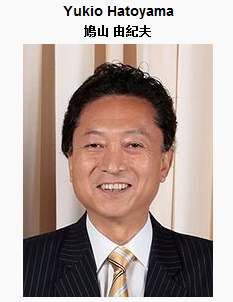 하토야마 간사장은 독도의 역사적 사실에 대해서는 어느 정도 인정했지만 샌프란시스코 조약을 둘러싼 국제법적 해석에 있어서 한국 측 논리(당시), 즉 독도를 한국 땅으로 인정한 1946년의 연합국 문서가 51년에 조인된 샌프란시스코 조약에도 반영됐다는 논리를 ‘한국 측 논리일 뿐’이라고 일축했다. 이에 덧붙여 ‘나는 일본인이니까 역시 다케시마(독도의 일본명)는 일본 것이라고 생각한다’고 민족주의적 감정을 드러냈다. 그 모습에 나는 실망감을 느꼈다. 현재도 그 상황 그대로라면 하토야마 총리의 생각은 독도는 ‘역사적으로 한국 것이었을 가능성은 있지만 결과적으로 샌프란시스코 조약상 일본 것이 됐고 자신은 일본인이므로 그것을 믿는다’는 것일 수 있다.
하토야마 간사장은 독도의 역사적 사실에 대해서는 어느 정도 인정했지만 샌프란시스코 조약을 둘러싼 국제법적 해석에 있어서 한국 측 논리(당시), 즉 독도를 한국 땅으로 인정한 1946년의 연합국 문서가 51년에 조인된 샌프란시스코 조약에도 반영됐다는 논리를 ‘한국 측 논리일 뿐’이라고 일축했다. 이에 덧붙여 ‘나는 일본인이니까 역시 다케시마(독도의 일본명)는 일본 것이라고 생각한다’고 민족주의적 감정을 드러냈다. 그 모습에 나는 실망감을 느꼈다. 현재도 그 상황 그대로라면 하토야마 총리의 생각은 독도는 ‘역사적으로 한국 것이었을 가능성은 있지만 결과적으로 샌프란시스코 조약상 일본 것이 됐고 자신은 일본인이므로 그것을 믿는다’는 것일 수 있다.
Prime Minister Hatoyama recognized the historical facts of Dokdo to a certain degree but, regarding it as just the Korean opinion, rejected the Korean logic of the time regarding the interpretation of international law surrounding the Treaty of Peace with Japan [signed between the US and Japan] – which is that the documented position of the Allied countries of 1946 which recognized Dokdo as Korean land would have been reflected in the Treaty of Peace with Japan, which was signed in 1951. In addition, he showed ethnocentric emotion by saying, “Since I am Japanese, I think that Takeshima (the Japanese name for Dokdo) belongs to Japan.” I felt disappointed by that expression. Even if our meeting took place now, Prime Minister Hatoyama might still think, “There is a possibility that Dokdo was Korean historically but as it ended up to be Japanese in the Treaty of Peace with Japan, this is what I believe because I am Japanese.”
그런데 그 후 새로운 자료가 발견됐고 한국 측 논리는 크게 발전됐다. 하토야마 총리가 현재의 샌프란시스코 조약에 관한 한국 측 해석을 들으면 개인적으로 생각을 좀 더 수정할 가능성이 있다고 본다. 그는 지난해 12월에는 고등학교 사회과 교재 해설서에서 ‘다케시마(독도)는 일본 땅’이라는 직접적 표현을 삭제하는 데 결정적 역할을 했다. 그러나 최근 기자들의 질문 공세에 밀려 독도에 대한 ‘일본 정부의 방침을 바꿀 생각이 전혀 없다’는 견해를 밝혔다. 그러나 그 자리에서도 그는 ‘독도는 일본 땅’이라는 표현만은 피했고, 외상도 “한국이 (독도를) 불법점거하고 있다는 표현은 쓰고 싶지 않다”고 말했다. 지지율이 계속 하락하고 있는 현 상황에서 7월의 참의원선거를 앞에 두고 민주당에 불리한 발언은 피해야 하는 입장에서 불가피한 선택이었을지 모르나 내 고교와 대학교선배이기도 한 그가 민족주의적 감정을 극복하고 아시아를 크게 품었으면 하는 마음이 간절하다.
But since then, new materials have been discovered and the Korean position has advanced greatly. If Prime Minister Hatoyama were to listen to the current Korean interpretation regarding the Treaty of Peace with Japan, I think he might revise his personal thoughts on it a bit more. Last December in a position paper regarding the social studies curriculum in Japanese high schools, he took a decisive role in having the direct expression deleted which said, “Takeshima (Dokdo) is Japanese land.” Recently, having been pressured under questioning by journalists, he expressed this position: “There is no consideration being made to change the Japanese government’s guidelines” regarding Dokdo. But even as he said that, he still avoided using the expression “Dokdo is Japanese land” and the foreign minister has also said, “[We] don’t want to use the expression that Korea is illegally occupying [Dokdo]”. Currently, as Prime Minister Hatoyama’s support is continuing to fall and with the House of Councillors elections coming up in July, it may be an inevitable choice to avoid expressions which are disadvantageous to the Democratic Party of Japan. But he is also my senior alumni from both high school and university and I have a strong hope that he will overcome his ethnocentric bias and embrace the Asian perspective.
